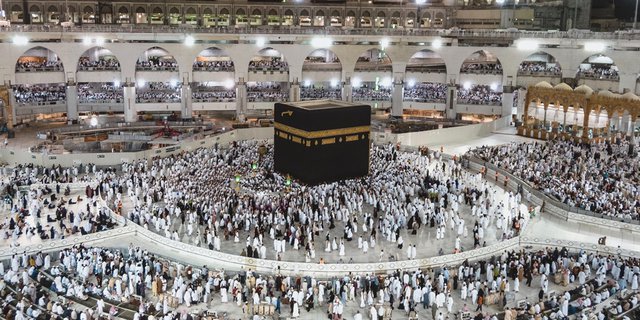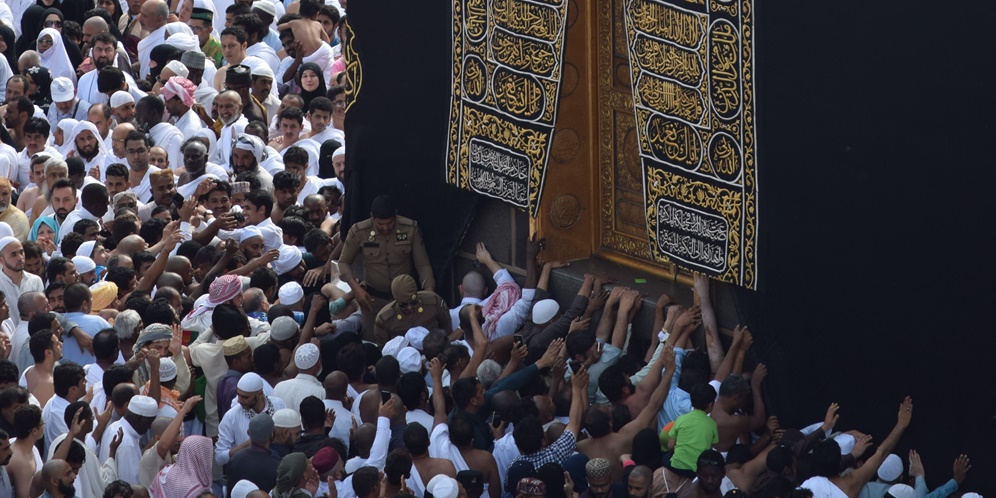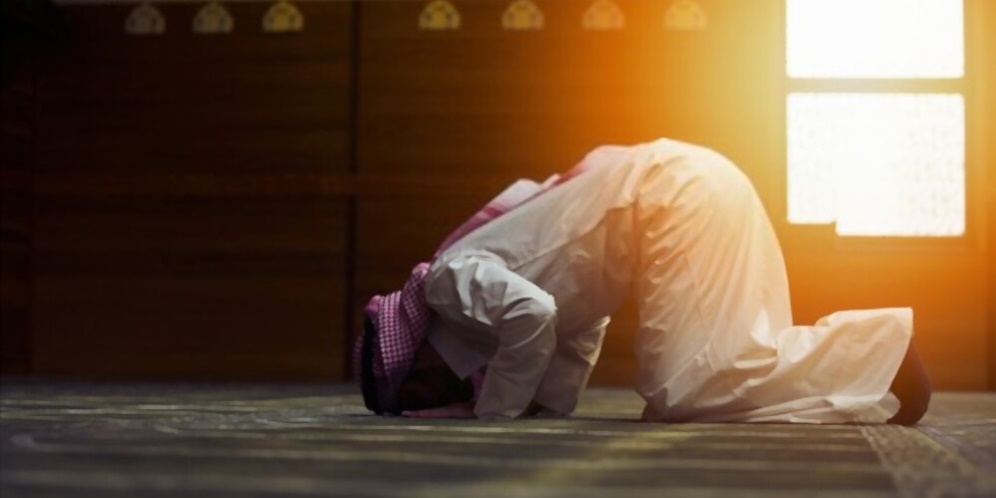The Phenomenon of the Proliferation of Branded Fashion in Hong Kong: Endless Queues, Tax-Free Too!
One of the areas in Hong Kong that is full of branded stores is Harbour City, which is the largest mall in the Pearl of the Orient.

Dream - In the implementation of Hajj worship, Muslims are familiar with the pillars of Hajj and obligatory Hajj. All Hajj pilgrims should strive to fulfill all the requirements of the pillars and obligatory Hajj so that their worship is considered valid and becomes a blessed Hajj.
When there is still time before departing for Hajj, prospective pilgrims should study or follow guidance on Hajj worship to know what is obligatory, permissible, and prohibited during the Hajj pilgrimage.
In addition to the pillars of Hajj and obligatory Hajj, prospective Hajj pilgrims also need to know what the sunnahs of Hajj are. Although they are not obligatory, Hajj pilgrims who perform these sunnah acts can hope to receive rewards from Allah SWT.
Being in the land of the birth of Prophet Muhammad SAW and the Kaaba, of course, we want to make the most of every second by performing worship activities that can bring us closer to Allah SWT.It would be a pity if we were to leave all the good deeds, both obligatory and sunnah acts of Hajj.
Now, here is a more complete explanation of the sunnahs of Hajj according to scholars as summarized by Dream through islam.nu.or.id.

From the perspective of the Shafi'i school, specifically through the opinion of Sheikh Abu Syuja, it is mentioned that there are seven sunnahs of Hajj for Muslims. Here are the seven sunnahs of Hajj:
1. Ifrad, which is performing the Hajj pilgrimage first and then the Umrah pilgrimage.
2. Talbiyah, which is reciting the talbiyah that was taught by the Prophet Muhammad saw "Labbaik allahumma labbaik".
3. Tawaf qudum.
4. Mabit in Muzdalifah.
5. Sunnah prayer of two raka'ahs after Tawaf.
6. Mabit in Mina.
7. Tawaf wada.
However, the opinion of Abu Syuja actually received notes from subsequent Shafi'i scholars, namely KH Afifuddin Muhajir. According to KH Afifuddin Muhajir, the opinion about the sunnahs of Hajj according to Abu Syuja mentioned above is classified as obligatory for Hajj. Here is the explanation:
"The fourth (mabit in Muzdalifah) on the night of Nahar (9th of Dhu al-Hijjah). The opinion that considers mabit in Muzdalifah as obligatory for Hajj is weak. According to the established opinion, mabit in Muzdalifah is considered obligatory for Hajj,"
According to KH. Afifuddin Muhajir, mabit in Muzdalifah is a weak sunnah of Hajj. The stronger opinion is that it is obligatory for Hajj. Not only that, it is also explained about mabit in Mina on the days of Tashriq, which are the 11th, 12th, and 13th of Zulhijah. Here is the complete explanation:
"The sixth (mabit in Mina) on the nights of Tashriq. According to the established opinion, mabit in Mina is considered obligatory for Hajj,"
In addition, the sunnah of Hajj also explained by KH Afifuddin Muhajir is about tawaf wada. According to him, tawaf wada is included in the obligatory acts of Hajj, not the sunnah of Hajj. This is in accordance with the opinion of the authentic Shafi'i scholars. Here is the explanation:
"The seventh (tawaf wada) when leaving the city of Mecca. According to the established opinion, tawaf wada is considered obligatory for Hajj,"
Thus, the sunnah of Hajj according to the opinion of the established Shafi'i scholars after the notes from KH Afifuddin Muhajir mentioned above are as follows:
1. Ifrad, which is performing the Hajj pilgrimage first and then the Umrah pilgrimage.
2. Tawaf qudum.
3. Sunnah prayer of two raka'ahs after Tawaf.

After knowing the sunnahs of Hajj according to the Shafi'i school, Dream friends also need to know how to perform the recommended prayer of two raka'ahs of Tawaf. Actually, this sunnah prayer of Tawaf can be performed anywhere while you are in the sacred land. However, it would be better if the prayer is performed behind the Maqam Ibrahim.
This is explained by KH Afifuddin Muhajir as follows:
"The fifth (prayer of two raka'ahs after Tawaf), which is two raka'ahs after completing Tawaf. The sunnah prayer of Tawaf is performed behind the Maqam Ibrahim. If that is not possible, then the sunnah prayer of Tawaf is performed in Hijr Ismail. If that is not possible, the sunnah prayer of Tawaf is performed in the mosque. If that is not possible, then the sunnah prayer of Tawaf is performed anywhere in the sacred land,"
For the procedure itself, the sunnah prayer of Tawaf is performed just like when you perform the prayer in general. The recitation of the Quranic verses in the prayer is also recited as usual, where the verses in the Quran are recited silently during the day and recited aloud at night. This is explained as follows:
"(The Quran is recited slowly (silently) in the sunnah prayer of Tawaf during the day) except after Fajr. (The Quran is recited loudly (aloud) at night) and after the sunrise until the sunrise,"
اللَمَى ارنمرَ تناَرماَ مرنَماناَ هاَرماناَ فاتمابماَ منابماَ نارماناَ فابماتمابماَ مراتمابماَمَى ماِابماَ ناب نارمَاتانَ فنَمابانَ أالاناماناَمَ الابماناَمَى هالاَ ناباماناَمَى اِادابَ فناسائمَى الماناَمَى مَابماتانَ الارَمابماَمَى
اللَمَى ارنمرَ تناَرماَ البارَاناَ بنارمَ ماتمابماَ نارماناَ البارَاناَ بنكاداَ الراناَمَ اللَمَى الروناناَ البارَاناَ البارَاناَ بنكاداَ البارَاناَ الراناَمَى اللَمَى الرنمرَ البارَاناَ البارَاناَ اللَمَى الرنمرَ البارَاناَ اللَمَى الرنمرَ البارَاناَ اللَمَى الرنمرَ البارَاناَمَى
اللَمَى البارَاناَ اللَمَى البارَاناَ البارَاناَ اللَمَى البارَاناَ اللَمَى البارَاناَ اللَمَى البارَاناَ اللَمَى البارَاناَمَى
Allahumma innaka ta'lamu sirra wa'alaaniyatiiy faqbal mu'dziratiiy, wata'lamu khajatiiy faa'thiniiy su'liy, wata'lamu maa fiinafsiiy fafhfirliy dzunuubii
Allahumma inniiy as'aluka iimaana daaiman yubaasyiru qalbiiy, wayaqiinan shaadiqan khatta a'lamahu laa yushiibuniy illa maa katabtalii ridho minka bimaaqasamta liiy, anta waliyyafiidunyaa wal akhirati, tawafanii muslimiina walkhiqnii bissholikhiin
Allahumma laa tada'lanaa fii maqaami naa hadzaa dzanban ilaa ghafartahu, wa laa haman illa farrajtahu, wa laa khajatan illa qadhoitahaa wayassartaha, fayassar amuuranaa wasyrah shuduuranaa, wanawwarquluubanaa, wakhtimbssholikhaati a'maalanaa.
Allahumma tawafanaa muslimiina wa akhyinaa muslimiina walkhiqnaa, bissholikhiina ghaira khozaaya wa laa maffatuuniin.
Artinya:
"Ya Allah, sesungguhnya Engkau Maha Mengetahui rahasiku yang tersembunyi dan amal perbuatanku yang nyata, maka terimalah ratapanku. Engkau Maha Mengetahui keperluanku, kabulkanlah permohonanku. Engkau Maha Mengetahui apapun yang terkandung dalam hatiku, maka ampunilah dosaku.
Ya Allah, aku ini mohon pada-Mu iman yang tetap yang melekat terus di hati, keyakinan yang sungguh-sungguh sehingga aku dapat mengetahui bahwa tiada suatu yang menimpa daku selain dari yang Engkau tetapkan bagiku. Jadikanlah aku rela terhadap apapun yang Engkau bagikan padaku.
Wahai Tuhan yang Maha Pengasih dari segala yang pengasih. Engkau adalah pelindungku di dunia dan di akhirat. Wafatkanlah aku dalam keadaan muslim dan gabungkanlah kami kedalam orang-orang shaleh.
Ya Allah, janganlah Engkau biarkan di tempat kami itu suatu dosapun kecuali Engkau ampunkan, tiada suatu kesusahan hati, kecuali Engkau lapangkan, tiada satu hajat keperluan kecuali Engkau penuhi dan mudahkan, maka mudahkanlah segenap urusan kami dan lapangkanlah dada kami, terangkan hati kami dan sudahilah semua amal perbuatan kami dengan amal yang shaleh.
Ya Allah matikanlah kami dalam keadaan muslim, hidupkanlah kami dalam keadaan muslim, dan masukkanlah kami kedalam golongan orang-orang yang shaleh tanpa kenistaan dan fitnah."
That is the explanation of the sunnah of Hajj that Dream friends need to know. And the implementation of the recommended prayer of two raka'ahs of Tawaf, which would be better if performed behind the Maqam Ibrahim, although actually this sunnah prayer can be performed anywhere while in the sacred land.
Cobain For You Page (FYP) Yang kamu suka ada di sini,
lihat isinya
One of the areas in Hong Kong that is full of branded stores is Harbour City, which is the largest mall in the Pearl of the Orient.
The determination is based on the real calculation of the appearance of the crescent moon followed by the Tarjih and Tajdid Council.
Who would have thought that Aldi Taher's song became the background for FIFA's post.
Erina vents on Twitter, asking the media to use photos of Kaesang that have already 'glowed up'.
Aside from being beautiful, Elva, who has blonde hair and fair skin, is also intelligent and smart. She has successfully gone international by pursuing higher education in Germany.
She intentionally met her sister without telling her beforehand.
Unfortunately, the man did not have enough money to immediately buy a new phone. He had to save and cut daily expenses.
The winner is not Ricis, Atta Halilintar, and Raffi Ahmad.
The man even behaves cutely by asking his daughter to eat more.
Not accustomed to kissing a child, then Allah SWT can withdraw the mercy from their parents.
But no one expected the man to discover a secret city in his house in 1963.
The forgiveness of sins does not solely depend on one act, but also requires sincere intentions, repentance, remorse, and efforts to not repeat the sin.